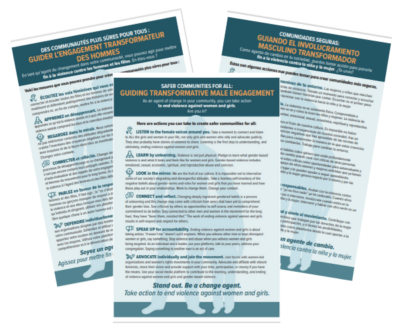‘Purpurina’: A Fun, Feminist Take on Sex Ed for Mexico’s Teens

How can a purple wig and a glittery-lipsticked YouTube character help young people navigate the complicated world of puberty?
In Purpurina, a new Spanish-language video series produced by WomenStrong partner Mujeres Aliadas, those elements create a fun, non-judgmental space to reduce the stigma and embarrassment that sometimes comes with talking about sex, especially with adults.
Across cultures, parents can be uncomfortable or unwilling to talk to their teens about sex. And with many schools offering limited sexuality education content, or none at all, too many teens worldwide lack the accurate information they need to make informed choices about their reproductive health – or even worse, are pressured into sex before they are ready.
This is a reality that WomenStrong partner Mujeres Aliadas is seeking to change.
Working in the lake region of Michoacán, in western Mexico, Mujeres Aliadas provides community education, formal midwifery training, and dignified and qualified maternal healthcare to ensure that women and young people can make healthy and informed decisions about their bodies, sexuality, and reproduction. The approach is rights-based, based in the belief that women should be key agents in their lives, especially when it comes to their own health.
These values extend to Mujeres Aliadas’s work to educate young people, which was launched at the request of mothers in Mujeres Aliadas’s community education programs who wanted their daughters to grow up better informed than they were.
“One of our midwives was giving a talk, when one mother mentioned wanting that same information to reach her kids, since she couldn’t always find the right words or the right moment to talk to them about the changes that came naturally with puberty,” Adolescent Program Director Ana Magaña says.
That’s when the Mujeres Aliadas staff began to give talks and workshops about sexual and reproductive health aimed specifically at adolescents and eventually extended their program into local schools.
Their approach is non-judgmental, with the goal of helping young people to “discover, explore, enjoy, take care of, and understand their adolescence,” says Ana Magaña.
Prior to the COVID pandemic, Mujeres Aliadas offered in-person youth workshops to address reproductive health topics such as menstruation and pregnancy, as well as self-esteem, bodily autonomy, healthy relationships, and violence prevention. The content was presented in a fun, entertaining, and participatory way, to help overcome any hesitancy their teen audience had in talking to adults about topics related to sex.
Then, when the COVID pandemic struck, though Mujeres Aliadas staff quickly resumed their clinical maternal health services, the organization had to retool their educational programs. With schools and community spaces shuttered and in-person gatherings not safe, they transitioned online.
In addition to reaching out on social media platforms, staff began planning an online video series to offer age-appropriate, culturally relevant, and fun sexual education content produced specifically for Mexican teens.
It was a new challenge for the Mujeres Aliadas team.
“After various failed attempts at success, a character came into our lives that would turn out to be our ally to achieve our mission: Purpurina,” Ms. Magaña jokes.
The Purpurina videos share the fun, joyful spirit of their other adolescent educational resources. The series adopts a fictionalized approach by sharing the thoughts of a teenage girl whose questions are answered by a purple-haired, glittery alter ego.
The series include five videos that cover everything from being confident in your appearance, to sexual autonomy, to topics of gender and sexual identity. It is available to view free online on YouTube and can be used by other nonprofits in their own youth outreach.
Mujeres Aliadas is one of 18 partners in the WomenStrong Learning Lab, which includes organizations working in 15 countries to advance girls’ education, women’s health, and violence prevention. Partners receive grants to implement community projects in one of these three areas and come together virtually and in-person (when it is safe to do so) to share what they have learned. WomenStrong’s goal is for partners to strengthen each others’ work and to advance progress for women and girls by learning together.



